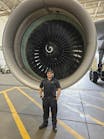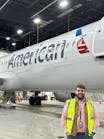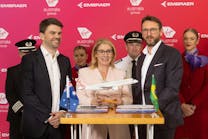Airbus Unconcerned About Poor Sales Record at Air Shows, CEO Says
Jul. 20—FARNBOROUGH, U.K. — Despite the scope and size of the Farnborough Air Show, Airbus left with an unusually low number of sale announcements.
Yet in an interview, CEO Guillaume Faury joked about it. After a three-year break from the big Air Shows, "maybe we need to remember how we organize it," he said, laughing.
Rather than talking sales to airlines, he said his focus at Farnborough is on meeting suppliers to talk about the challenge of building jets as the supply chain wobbles from the impact of labor shortages and the war in Ukraine.
Despite issues with late deliveries of engines and other parts, Faury offered a confident defense of the company's aggressive ramp-up plans, which threaten to create a severe imbalance with Boeing's production rates.
Two executives in Airbus Americas described the planned growth of Airbus in the U.S. and Canada and the market for the A220 jet built in Mirabel, Quebec, and Mobile, Alabama.
Unfazed by Boeing's showing
In the past, Airbus routinely trounced Boeing in Air Show order tallies.
In the first two days of Farnborough this year, Boeing announced orders for 142 MAXs from Delta, 777 Partners and ACG and for five 787 Dreamliners from AerCap. Airbus could boast only an order for 12 small single-aisle A220s from Delta.
Faury seemed content to rest on the sales lead over Boeing that Airbus built in the first half of 2022 and with the big additional commitment from Chinese airlines to buy 292 Airbus jets just before the Air Show.
Through June, Airbus won 259 net new jet orders to Boeing's 186.
As for the lackluster Air Show sales, Faury said, "We've been a bit less focused on the show itself for announcing deals and more focused on meeting with our suppliers."
"The supply chain is really the big issue at the moment," he said. At the end of June he said Airbus had parked 26 so-called "gliders," planes otherwise complete but missing their engines.
The engine makers are behind schedule, struggling with their own supply chains and labor shortages. Boeing has the same issue with delays to LEAP engines for the 737 MAX, but is choosing to slow production rather than build gliders.
"You are damned if you do, damned if you don't," Faury said.
"If you don't do the gliders, you slow down your production rate that you are capable of doing to not be ahead of the engines. That's not good," he said. "If you do gliders and you store planes without engines, it's not good either. There is no good way forward."
Faury said when Airbus first announced in May 2021 its intention to ramp up from 40 single-aisle A320 jets per month to 65 per month in 2023, that wasn't an aggressive goal. In 2019, it had been building 63-64 of the jets per month.
Since then, labor shortages developed at suppliers as work returned but people didn't. The war in Ukraine and the rise in energy costs has further disrupted the Airbus supply chain.
Ramping up to 65 jets per month by 2023 "was not per se a huge challenge," Faury said. "It has become a big challenge because of the very bad state of the supply chain."
However, Faury said the current engine shortage is not as bad as it was in 2018 when CFM and Pratt & Whitney both had serious issues in their initial ramp-up of their LEAP and GTF engines.
By June 2018, Airbus had 100 gliders parked outside its factories and had delivered only 303 airplanes, he said. Airbus had recovered and delivered a total of 800 airplanes by the end of that year.
So Faury is determined to work through the supply chain problems again and will continue to push for the high production targets.
Airbus plans to break ground in January on a second A320 final assembly line in Mobile, Ala., and have it operational in 2025.
That will bring the number of A320 production lines across the globe to nine: two in Mobile; two in Toulouse, France; four in Hamburg, Germany; and one in Tianjin, China.
Boeing has just three final assembly lines for the MAX in Renton and is using only two of those currently.
Sash Tusa, an industry analyst with London-based Agency Partners, said the relative sales performances of the two manufacturers at Farnborough won't matter nearly as much as the growing imbalance in production rates.
"When we get away from here, get back home, have a shower, probably have a good night's sleep and sort ourselves out, as an analyst, am I going to change my production forecast?" Tusa said.
"No. Boeing will be producing 737 MAXs somewhere in the high 30s per month. Perhaps they get to 40," he said. "Airbus will be producing the A320neos at eventually high 60s per month, possibly 70."
"That's a very uncomfortable ratio," for Boeing, he said.
Besides the A320neos that compete directly against the 737 MAXs, Airbus is also building smaller, five-abreast single-aisle A220s.
That's the former Bombardier CSeries jet that Airbus bought in 2018 and now builds in Canada and in Mobile; Delta and JetBlue are the major U.S. customers for the plane.
In a separate interview, Jeff Knittel, CEO of Airbus Americas, said the plan is to ramp up from six small single-aisle A220s per month now to 14 per month by 2025.
With two A320 final assembly lines plus one A220 final assembly line in Mobile, with paint hangars and a new engineering center there, the current workforce of about 1,700 workers is expected to grow to between 2,500-3,000 over the next few years, Knittel said.
That's a small workforce compared to the 56,000 employees Boeing has in Washington state, but it's a seed that's sprouted.
The Pentagon is weighing whether to buy more Boeing KC-46 tankers for its second round air-to-air refueling tanker contract or to make it a competition between the KC-46 and the Airbus MRTT tanker, a derivative of the A330.
If it is a competition, Airbus will offer Mobile as the place to build its candidate.
Airbus has another threat to Boeing: potential development of a bigger version of the A220 — called the A220-500 — that would compete with a much more modern design against the smaller 737 MAXs.
Airbus sales chief Christian Scherer said it's a matter of when this will happen, not if.
Rob Dewar, who was one of the original three employees who started the CSeries program at Bombardier in 2004 and is now Airbus senior vice president on the A220 program said "I really believe it will happen."
If so, Airbus likely won't launch the A220-500 for several years so as to sell out more of its A320neos first. After that, it could leave the smaller single-aisle market to the A220 models and keep selling the larger A321neos.
So like Faury, Dewar is concentrated on a more near-term objective: the ramp-up to 14 jets per month, maturing the aircraft program as it becomes more established at airlines around the world and reducing manufacturing costs, which will be helped by the higher production rate.
What will Boeing do if Airbus launches the A220-500? It's already seemed to rule out building a new plane to replace the MAX.
Asked on Monday, Boeing Commercial Airplanes CEO Stan Deal responded with one word: "Undecided."
___
(c)2022 The Seattle Times
Visit The Seattle Times at www.seattletimes.com
Distributed by Tribune Content Agency, LLC.


